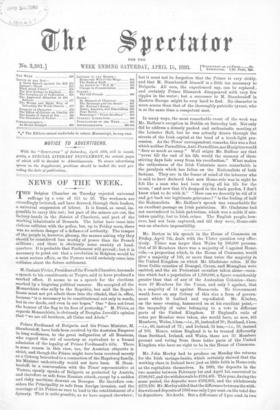Mr. Barton in his speech in the House of Commons
on Friday, April 7th, dealt with the Ulster question very effec- tively. Ulster was larger than Wales by 100,000 persons. Out of 33 Members there was a majority of 5 against Home- rule,—a proportion which, in the House of Commons, would give a majority of 100, or more than twice the majority in the United Kingdom on which Mr. Gladstone relies. If the three Celtic counties of Donegal, Cavan, and Monaghan were omitted, and the six Protestant counties taken alone—coun- ties which had a population of 1,200,000, a figure considerably greater than that of any of the Australian Colonies—there were 19 Members for the Union, and only 5 against, that is, a majority of 14 against Home-rule. No Government would force on any Colony of this size a form of govern- ment which it loathed and rep udiated. Mr. Kimber, on the same evening, hammered on at his excellent point,— the inequality of value belonging to a vote in different parts of the United Kingdom. If England's ratio of votes per Member were taken, she would have, as now, 465 Members; Wales, 5 less,—i.e., 25, instead of 30; Scotland, 4 less, —i.e., 68, instead of 72; and Ireland, 24 less,—i.e., 79, instead of 103. Hence, unless England is to be treated differently than Scotland, Ireland, and Wales, there are 33 Members present and voting from these latter parts of the United Kingdom who have no right to be in the House of Commons.






































